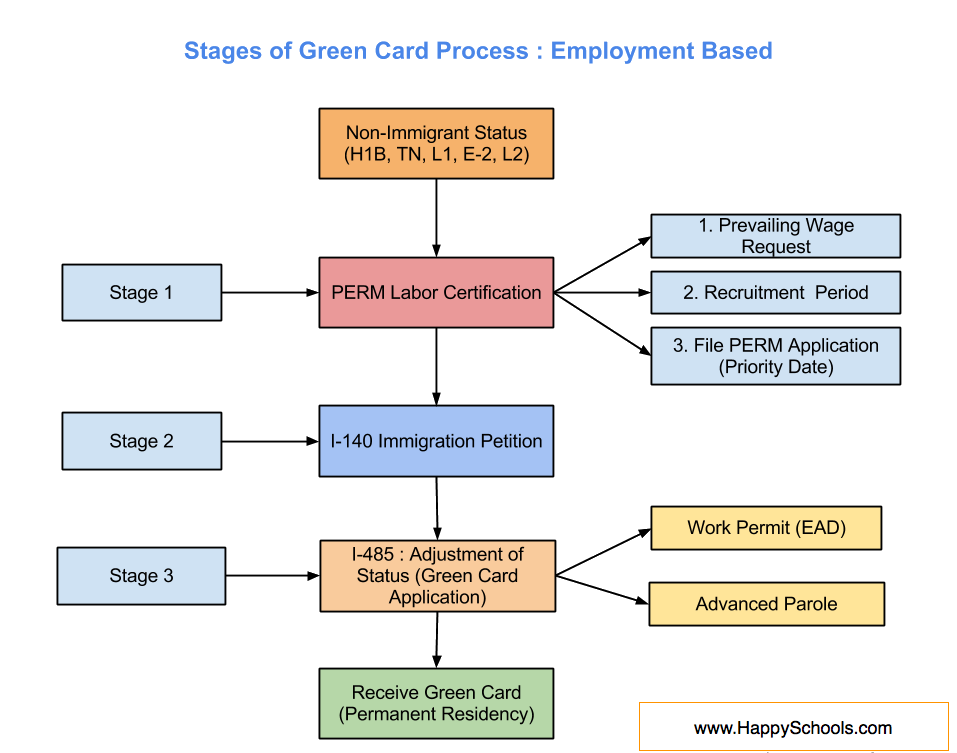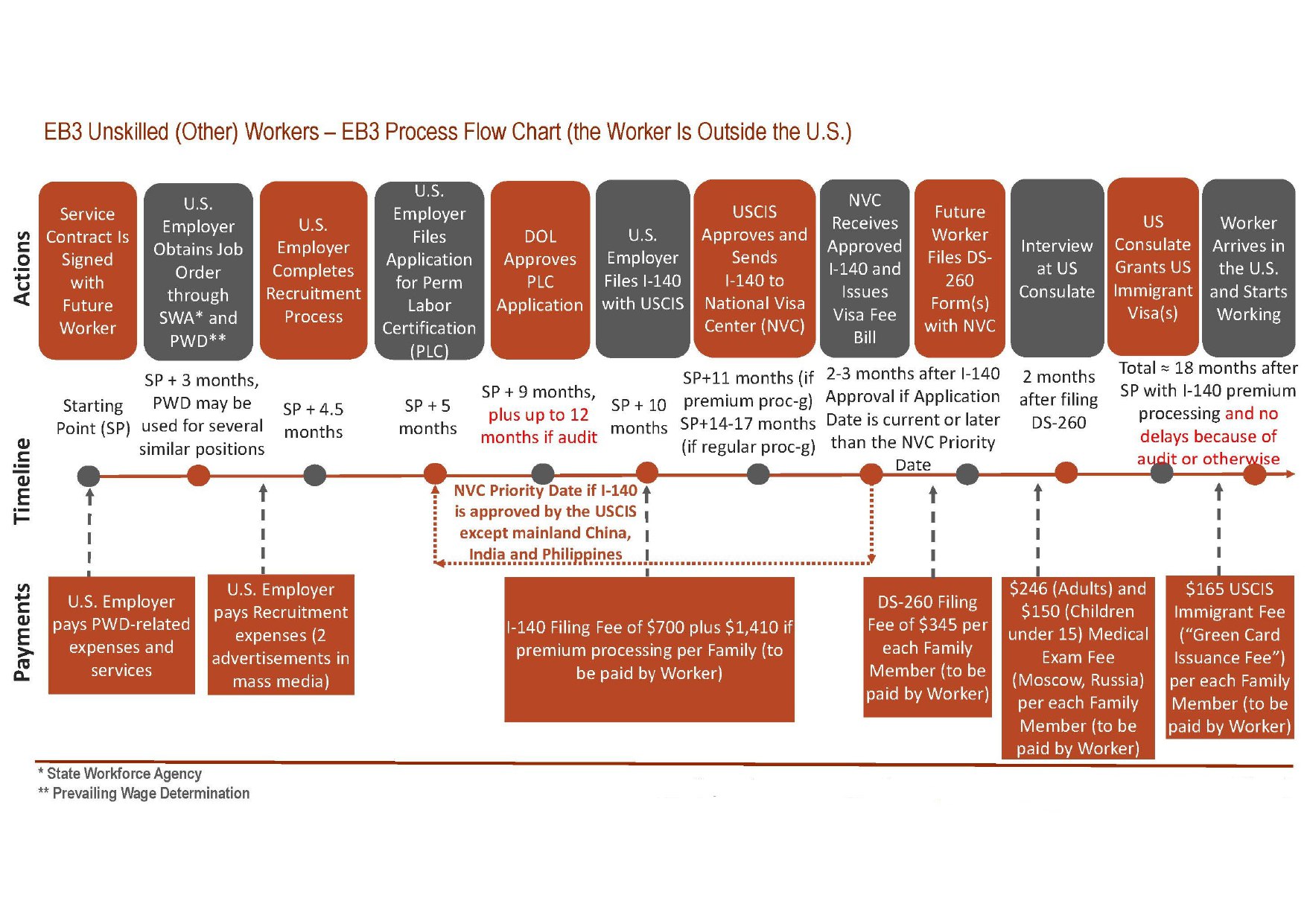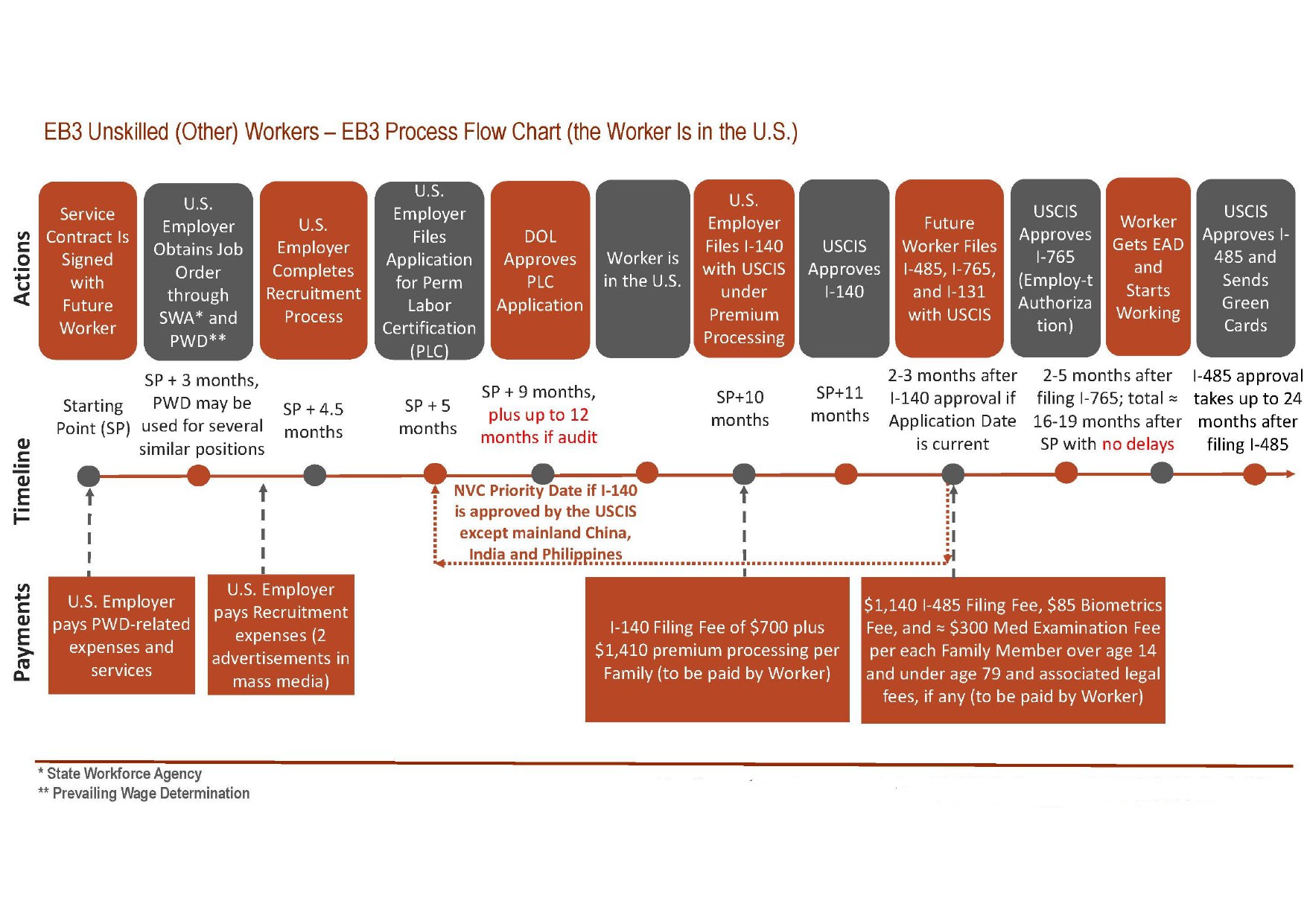EB-3 Visa
This program allows the worker-applicant, their spouse, and their unmarried children under 21 years of age to obtain Green Cards in exchange for agreeing to enter into an employment contract with a U.S. employer to perform unskilled work (such as operating a truck with a CDL license or working as a diesel mechanic) for a specified period at a mid-level wage.
The specified period does not mean the worker-applicant is obligated to work in such a job for the rest of their life, but changing jobs at the worker-applicant’s initiative within two years of starting work with the sponsoring U.S. employer is undesirable, as it may create problems later when renewing the Green Card due to its expiration or applying for U.S. citizenship through naturalization. The spouse and adult children of the worker-applicant may work in the U.S. in any job without restriction immediately after receiving their Green Cards.
All immigration documents are prepared and supported by experienced, licensed U.S. immigration attorneys.
Currently, the cost of preparing documents for participation in the program starts at $10,500 per employee. Payment is made according to the Agreement.
The EB-3 Work Visa involves several steps to obtain it:
- Determining eligibility for permanent residence and work in the United States.
- Assigning an immigrant visa number to the applicant.
- Submitting an application to the U.S. Department of Labor Administration by the U.S. employer.
- A Petition for Permanent Residence must be filed when the immigrant visa application is due.
Processing Steps – Obtaining a Work Permit if a Person is in the United States:
If a person is located in the United States, they are eligible to apply for a US work visa.
The following information about the applicant is required:
- Company information and a description of services;
- Description of employee benefits and evidence of their uniqueness to the company;
- Employer’s job title;
- Expected salary;
- Company founding date;
- Employer’s tax identification number;
- Number of employees working for the company.
The following documents are also required:
- Copies of a valid passport with a US entry stamp;
- Form I-94;
- Complete resume;
- Academic diplomas with supplements;
- Current status information in the U.S.;
- Detailed description of work experience in the specialty.
EB-3 entitles the applicant to:
- Work in the United States and reside permanently in the United States;
- Freely enter and leave the United States;
- Apply for a Family Reunification Visa.
The EB-3 visa is intended for:
- Specialists with a US diploma (bachelor’s degree) or, for those with foreign degrees, equivalent status;
- Qualified workers who can adequately perform the assigned tasks.
You need to pay for such services and fees
The government is increasing various fees (I-140 processing fee and premium processing fee), so service fees are increasing.
$145 per week for 156 weeks (3 years) – employer fee.
$70 per week for 156 weeks – immigrant fee (this fee is based on the immigrant already being in the U.S. and already having a CDL).
If the driver does not have a CDL, they must pay for CDL school.
Services – We act as a process agent. We prepare and file all legal documents for both the employer and the immigrant. This includes all costs and does not incur any other fees.
- Experience: 2+ years of verified overseas work experience (OTR/off-site travel for two weeks at a time)
- Current Employment: Active driving and comfortable long-distance travel, including living in a truck
- Visa Status: Pursuing permanent residence (green card) in the U.S., currently in protective status such as TPS, U4U, or pending asylum
- Geography: Open to candidates from EB-3 visa-eligible countries residing in the United States.
- Language Skills: Basic English skills required.
- Personal History: No criminal convictions.
- The EA EB-3 visa program is designed for skilled truck drivers seeking to work and reside permanently in the United States on an EB-3 visa (green card).
- Successful applicants will receive a job offer from a U.S. employer who will sponsor their visa.
- The EA will manage the employment and immigration coordination process on behalf of the applicant.
- Because this visa is subject to U.S. government processing times, the entire process can take 30-45 months (depending on experience).
- The EA submits all required documentation, but timelines and approvals are beyond the EA’s control after submission.
 Failure to meet age or experience requirements
Failure to meet age or experience requirements Failure to submit required documents or failure to meet deadlines
Failure to submit required documents or failure to meet deadlines Poor communication or lack of response
Poor communication or lack of response Unprofessional behavior or behavior that does not meet program expectations
Unprofessional behavior or behavior that does not meet program expectations■ Full name
■ WhatsApp number
■ Email address
■ Years of verified work experience
■ Country of birth
■ Current country of residence
■ Current protected status
■ Willingness to relocate according to carriers’ preferences
Or, after receiving all the documents, I can send you an invoice for $500 for a preliminary legal review and schedule a free meeting with a lawyer sooner.

Jessica Wienhold
Vice President, WorkPath Visas
Jessica@WPVisas.com
319.830.7906
https://www.facebook.com/WorkPathVisas






